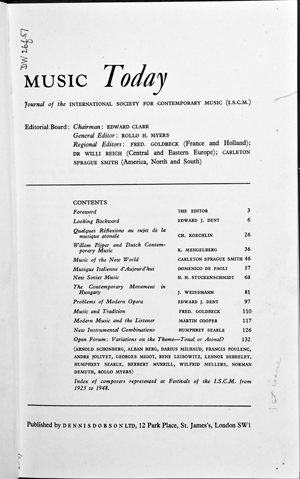Music Today
Prepared by Liesbeth Hoedemaeker
Online only (2017)

A single issue of Music Today, Journal of the International Society for Contemporary Music (I.S.C.M.) was published by Dennis Dobson Ltd. in London in 1949. The issue comprises 152 pages printed in single column format for articles and in two-column format for an “Open Forum” section containing the opinions of a number of writers on a single question concerning modern music. A ten-page “Index of Composers Represented at Festivals of the I.S.C.M. from 1921 to 1948” concludes the issue. The official languages of the so-called “Bulletin” are French and English. The original text, if in French is accompanied by a précis in English and vice-versa. The editor was Rollo H. Myers, supported by an impressive editorial board of regional editors for France and Holland (Fred. Goldbeck), for Central and Eastern Europe (Willi Reich), and for America, North and South (Carleton Sprague Smith). The contributors to the fledgling journal are among the most respected composers and writers-on-music of the immediate port-war period.
The issue begins with the Editor’s report on the I.S.C.M. since its foundation at Salzburg in 1922 through the twenty festivals up to 1948, the membership having increased from eighteen countries in 1923 to twenty-two countries in both hemispheres in 1948. Edward J. Dent, a founder of the society, discusses in an extensive article, the history of modern music following the First World War, the steps toward the organization of the festival devoted to an artistic principle by leaders of the movement, Paul Hindemith, Ernst Křenek, Hermann Scherchen and Eduard Erdmann, and goes on to describe the chaotic and friendly organization but high standard of performance at early festivals. Charles Koechlin studies the progress of dissonance and admits the legitimacy of atonal music. Karel Mengelberg investigates the background of Dutch composer Willem Pijper (1894-1947) leading to his personal form of musical expression. Carleton Sprague Smith explains the cosmopolitan language of original music the various cities of North and South America. Domenico De Paoli shows contemporary Italian music to exhibit every tendency from the most conservative to the most advanced, with younger composers lacking a clear directive, uncertain whether to follow Schoenberg or other modernist directions. H. H. Stuckenschmidt reports on the banning of the I.S.C.M. in the Soviet Union, the concept of musical progress being labelled “formalistic, bourgeois and anti-popular,” and continues with an examination of the music of those composers occupying a leading position both within and outside the Soviet Union. John W. Weissmann finds Magyar folk-music to be the formative force of a new school of music in Hungary, with Béla Bartók a symbol of Magyar music.
